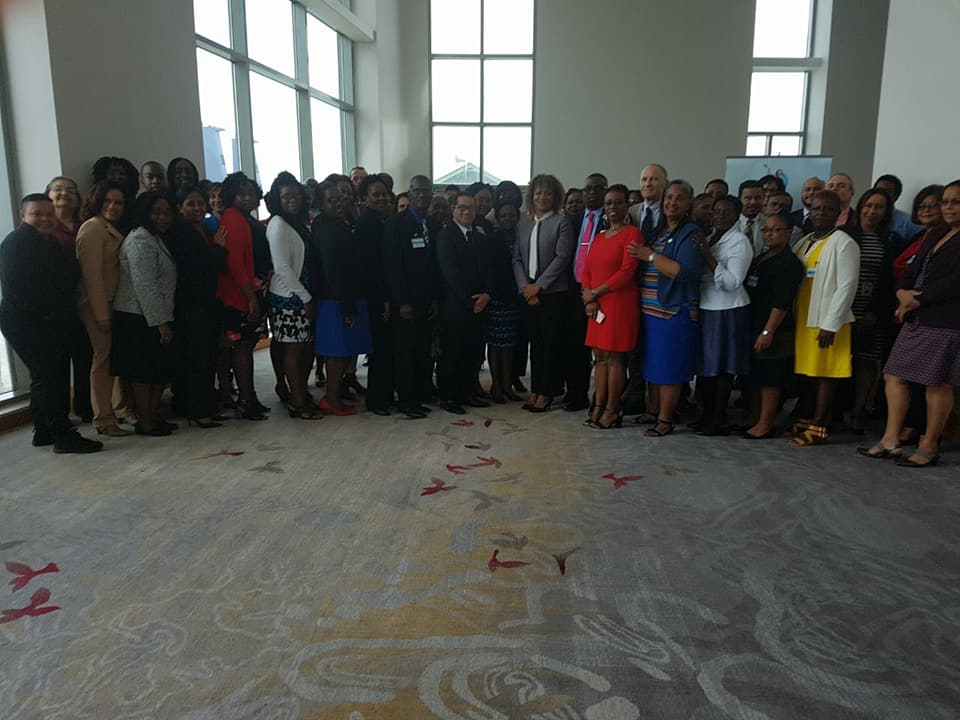
Stakeholders to address gaps and challenges in the STI responseResponse to be discussed within the context of combination HIV prevention approach, as well as the viral hepatitis response beyond immunization in the Caribbean.
PAHO, in partnership with PANCAP, CARPHA, UNAIDS and the U.S. Centers for Disease Control and Prevention (CDC), hosted the National action towards the elimination of STIs and Viral Hepatitis in the Caribbean: A sub-regional meeting in Port-of-Spain, Republic of Trinidad and Tobago from 21–23 May 2018.
The aim of the meeting was to stimulate National Action to address gaps and challenges in the STI response as part of HIV combination prevention and expand viral hepatitis response beyond immunization in the Caribbean.
Present were the Honourable Ayanna Webster-Roy, Minister of State in the Office of the Prime Minister, holding the portfolios of Gender and Child Affairs, Ecclesiastical Affairs and Central Administration Services, Tobago, Mr. Dereck Springer, Director of PANCAP, Dr. Virginia Asin-Oostburg, Director of Surveillance, Disease Prevention and Control at the Caribbean Public Health Agency (CARPHA), Dr. Massimo Ghidinelli, Director, PAHO, Unit for HIV, Hepatitis, Tuberculosis and Sexually Transmitted Infections, Dr. Edwin Vicente C. Bolastig, PAHO/WHO Representative, ad interim, Trinidad and Tobago.
The STI component focused on syphilis, gonorrhea, and HPV especially among pregnant women and their sexual partners, adolescents and key populations at increased risk for STIs/HIV. The Viral Hepatitis component focused on increasing the public health response, including access to HBV and HCV testing and treatment, and integration of hepatitis action within the general health system.
WHAT IS PANCAP?
PANCAP is a Caribbean regional partnership of governments, regional civil society organisations, regional institutions and organisations, bilateral and multilateral agencies and contributing donor partners established on 14 February 2001. PANCAP provides a structured and unified approach to the Caribbean’s response to the HIV epidemic, and coordinates the response through the Caribbean Regional Strategic Framework on HIV and AIDS to maximise efficient use of resources and increase impact, mobilise resources and build the capacity of partners.
What are the Global AIDS Strategy 2021–2026 targets and commitments?
If targets and commitments in the strategy are achieved:
- The number of people who newly acquire HIV will decrease from 1.7 million in 2019 to less than 370 000 by 2025
- The number of people dying from AIDS-related illnesses will decrease from 690 000 in 2019 to less than 250 000 in 2025.
- The goal of eliminating new HIV infections among children will see the number of new HIV infections drop from 150,000 in 2019 to less than 22,000 in 2025.
What are the 95-95-95 Targets for ending AIDS?
- 95% of People Living with HIV know their HIV status;
- 95% of people who know their status on treatment; and
- 95% of people on treatment with suppressed viral loads.
HELPFUL LINKS:
Global AIDS Strategy 2021–2026, End Inequalities, End AIDS
https://pancap.org/pancap-documents/global-aids-strategy-2021-2026-end-inequalities-end-aids/
Caribbean Regional Strategic Framework on HIV and AIDS (CRSF) 2019-2025
https://pancap.org/pancap-documents/caribbean-regional-strategic-framework-2019-2025/
